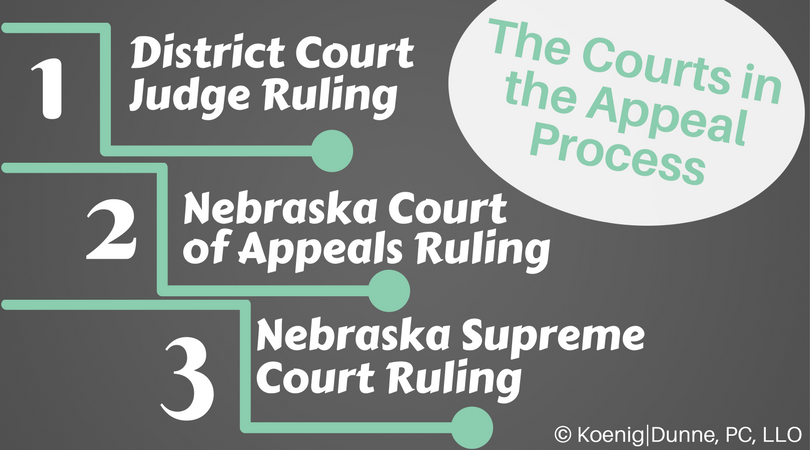In Nebraska, there are two levels of appellate courts. The intermediate level is the Nebraska Court of Appeals. In family law cases, a person will first file an appeal with the Nebraska Court of Appeals. After that appeal is decided, and you believe the Nebraska Court of Appeals was also wrong in its ruling, you may appeal to the next level, which is the Nebraska Supreme Court.
It is important to consider how the appellate court will review your case. Most orders in family law matters will only be reversed on appeal if the appellate court finds your trial judge “abused its discretion.” Trial judges have an immense amount of discretion in domestic relations matters, which means they have the broad authority to make decisions regarding your unique circumstances. They are present for the trial, they see and judge the credibility of the witnesses, and they receive the evidence. For these reasons, appellate courts will often defer to the trial judge’s opinion. If you are thinking about appealing, ask your attorney what the standard of review is. If the standard is whether your judge abused his or her discretion, an appeal may be warranted if you can show that your judge abused that discretion.
If you choose not to appeal, know that some issues, including custody, parenting time, child support, and alimony*, can be modified in the future, so long as there is a material change in circumstances. Certain aspects of your decree are not modifiable, including the division of property and debts or the award of attorney’s fees. If you choose not to appeal these issues, you will be barred from re-litigating them in the future.
Sometimes, the appellate court will want to hear from the attorneys as to why the trial judge did (or did not) err in the order. If the appellate judges want to hear more, they will set your case for oral argument. Oral arguments last about 20 minutes, with each side getting 10 minutes to present argument. The judges have the ability to question the attorneys face-to-face as to whether they should reverse (or uphold) what the trial judge did. Not all cases will be set for oral argument. If the appellate court believes it has enough information from the briefs, then it will issue an opinion without argument. However, there are cases that present unique questions that the appellate courts have not decided. If your case involves such a question, you can expect the court to call your case for oral argument.
Once arguments are complete, the final step is to wait for the appellate court to issue its opinion. The Nebraska Court of Appeals releases its opinions every Tuesday and the Nebraska Supreme Court releases its opinions every Friday. You can find recently-released opinions here.
The appellate process in Nebraska is complex and follows very specific rules and deadlines. It is imperative your appellate attorney is knowledgeable with the ins and outs of appellate practice. The attorneys at Koenig|Dunne are experienced with appellate practice and will advocate for you at the next level if you’ve received an unjust result. Contact us today.
Lindsay Belmont
*If no alimony is awarded in the decree, you will be forever barred from seeking alimony in the future. If alimony is awarded, it may be modified in the future if there is a material change in circumstances.

